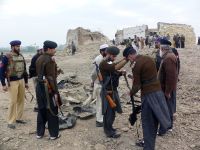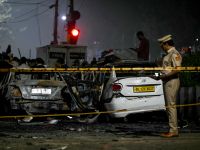Violence raged on in the West Bank and Gaza Strip Saturday, adding to the mounting body count and fuelling more Palestinian anger, as Israel prepared to take "time out" from the Middle East peace process.
Another four Palestinians were killed and at least 200 wounded in confrontations with Israeli troops in the Gaza Strip and West Bank as the territories ignited again following the funerals of nine people killed the day before.
After Friday's bloodletting, Prime Minister Ehud Barak announced "time out" from the peace process, saying Israel would rethink its approach at the end of this weekend's Arab summit in Cairo.
Barak said he had taken the step following what he claimed was the Palestinian Authority's failure to comply with a deadline to end violence set during a US-brokered summit at the Egyptian Red Sea resort of Sharm el-Sheikh on Tuesday.
Although Barak's statement appeared to leave some, albeit small, room for maneuver Friday, government spokesman Nachman Shai said Saturday the so-called time-out was now "well decided."
"Of course, if the Arab summit will come up with some statement and the Palestinians will suddenly stop the violence that would be very helpful, but it doens't look like it," he added.
He said it would be "the main topic" at Sunday's weekly cabinet meeting in Jerusalem.
Justice Minister Yossi Beilin, one of the main architects of the 1993 Oslo peace accords, Saturday came out in opposition to Barak, however, saying that the move could harm Israel.
"It is a serious error for us to pause the peace process," Beilin told Israeli public radio. "The peace process is not a basketball match and does not have time-outs."
Among Saturday's dead were three teenagers and a 32-year-old taxi driver, all hit by live rounds -- three of them in the head -- fired by the army.
Mohammed al-Najjar, 13, was pronounced clinically dead by doctors after he was hit in the head during clashes at Khan Yunis in the south of the Gaza Strip, while Omar al-Moheissi, 15, was shot in the chest during confrontations with troops protecting the Jewish settlement of Kfar Darom, in the south of the Gaza Strip.
In the divided West Bank town of Hebron, meanwhile, taxi-driver Fayez al-Qeimari died of his injuries after being struck by a bullet while cleaning his vehicle close to where a clash was occurring, according to witnesses.
At Ramallah, Majed Ibrahim Hawamdah, 15, died after being struck by a live round fired by the Israeli army, hospital sources said. More than 40 people were wounded in the clashes, hospital sources said.
Among the wounded at Ramallah was Jacques-Marie Bourget, a journalist for the French magazine Paris-Match, according to a photographer, Thierry Esch, who was with him.
Bourget was seriously wounded by a bullet in the left lung while he was covering the clashes, according to doctors in Ramallah. They said after an operation that he would recover.
Scores of injuries were reported Saturday in clashes at other West Bank towns and villages, including Bethlehem, Jenine, Tulkarem, Kalkiliya and Toubas.
At least 80 Palestinians were wounded in the Gaza Strip, 53 of them in the Khan Yunis clash alone.
The latest deaths brought to 127 the number of people killed in a three-week wave of violence across the Palestinian territories, all but a handful of them Palestinians. Close on 4,000 people have been wounded.
Saturday's confrontations followed calls to support the Intifada, or uprising, by a group of Palestinian parties, including Palestinian leader Yasser Arafat's Fatah movement, and the radical fundamentalist Hamas and Islamic Jihad groups.
Fatah's West Bank leader Marwan Barghouti vowed the Intifada would continue until Israel ended its occupation of the Palestinian territories.
He said he did not have the power to stop the uprising, despite Barak's threat.
A relative exception to Saturday's clashes was Nablus, which bore the brunt of Friday's violence, where some 20,000 mourners turned out to bury four Palestinians cut down by Israeli bullets.
Despite high emotions, the funerals went off with little incident and calls by local militants on youths to tone down the levels of protest appeared to have had an effect -- JERUSALEM (AFP)
© 2000 Al Bawaba (www.albawaba.com)







